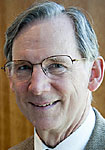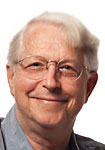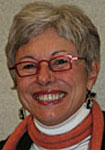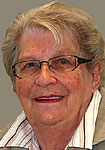How many chemistry professors have taught the subject longer than some elements have been listed on the periodic table? Lawrence University’s Jerrold Lokensgard for one.
The longest continuous member in the history of the Lawrence chemistry department, Lokensgard and three colleagues will be recognized with professor emeritus status Sunday, June 13 as retiring faculty at Lawrence’s 161st commencement.
Lokensgard, Professor of Biology Brad Rence, Professor of French Judith Sarnecki and Associate Professor and Director of Technical Services in the library Corrine Wocelka each will awarded honorary master of arts degrees, ad eundem, as part of the graduation ceremonies that begin at 10:30 a.m. on the Main Hall green. Between them, they have devoted a combined 129 years of service to Lawrence.
While nearly 10 new elements — all man-made ones — have been added to the periodic table since he began his teaching career, Lokensgard is quick to point out “all of the familiar ones are older than I am.”

An organic chemist, Lokensgard wasn’t even looking for job when he was hired by Lawrence in 1967. He held a post-doctoral fellowship at Iowa State University when a late spring resignation left Lawrence scrambling to fill a vacancy in its chemistry department. His advisor saw a job posting at national meeting and encouraged Lokengsard to apply. He did, got hired and never looked back.
During his tenure, Lokensgard helped secure nearly $500,000 worth of grants from the National Science Foundation and others for specialized instrumentation for Lawrence laboratories, including two nuclear magnetic resonance spectrometers, to ensure “we have the tools to teach students how we know the things we know.”
Known respectfully by his department colleagues as “The Oracle” for his wise counsel and less formally as “J-Lo” by students, Lokensgard has seen sweeping technological advances in his field over the past four decades, but the basic science remains largely unchanged.
“The questions I ask students aren’t all that different from the ones I asked 40 years ago,” said Lokensgard, who was appointed the Robert McMillen Professor of Chemistry in 1993. “We use newer and better instrumental and computational tools, but it’s still a matter of understanding things like the differences among salt, water and butter by exploring how their atoms are connected, using those principles to develop ways to make or break chemical bonds selectively and eventually designing ways to build new molecules with new and useful properties or applications.”
Lokensgard’s generous office hours frequently generated lines of students outside his door, but he considered that one of the best aspects of being a professor.
“My interactions with students certainly qualifies as a career highlight,” said Lokensgard, who has been known to end a term of general chemistry by serenading his class with a rendition of Tom Lehrer’s “The Element Song.” “Getting a genuine ‘I see’ from a student struggling with a problem is often the best part of the day.”
After 43 years in the classroom, Lokensgard jokes that he’s become conditioned to speak in 70-minute blocks — the length of most Lawrence classes. A tenor with the White Heron Chorale since its founding in 1978, Lokensgard plans to remain in Appleton in retirement, devoting his time and attention to reviewing lecture notes and lab results for possible publication, volunteering and spending more time with his three grandchildren.
Lawrence didn’t leave the best of first impressions on Brad Rence, but it eventually turned out to be a great fit for him.
As a high school junior from Mason City, Iowa, Rence visited Lawrence in 1964 as a prospective student. While he wound up choosing Grinnell College over Lawrence for his undergraduate education, he found his way back to Lawrence in 1979 as the newest member of the college’s biology department, where he has taught for the past 31 years.

A behaviorial physiologist, Rence’s scholarship has focused on invertebrates, especially crickets. Inspired by the manly woman/womanly man overtones of the Freshman Studies reading “A Room of One’s Own” by Virginia Woolf, Rence one transplanted brain parts from female crickets into male crickets and vice versa to see if gender-influenced locomotive behavior would be transferred. (It was.) And in answer to the question, “What’s a cricket’s brain worth?,” he once managed to keep a headless cricket alive for an entire month. (Apparently not much.)
Under the auspices of the U.S. Fish and Wildlife Service, Rence participated in a five-state survey of prairie invertebrates, collecting upwards of 4,000 insects each summer. Leading the survey of northeast Wisconsin, Rence studied the diversity of insects, comparing restored prairies to remnant ones. In 2009, he donated an extensive collection of mounted insects to the Brillion Nature Center collected from the Behnke Prairie east of Appleton.
Rence devoted similar attention to the coral reefs of the Caribbean during his career, participating in 14 biannual marine biology trips to the Cayman Islands (and one to Jamaica), compiling a diversity data set of animal and plant information.
“Those were the ultimate bonding experiences, living and working with students 24/7 for two full weeks,” Rence said of his aquatic field study trips.
Throughout most of his tenure, Rence has served as a faculty model for individualized instruction, teaching high numbers of tutorials and directing scores of independent study projects. He also was the last faculty member to serve a full academic year as director of Lawrence’s London Center (2002-03).
“I love teaching tutorials. They are such an exciting exercise in mutual discovery,” said Rence, one of only eight faculty members to receive both Lawrence’s Young Teacher Award (1985) and its Excellence in Teaching Award (2002). “And my year in London was certainly one of the highlights of my career.”
A week after commencement, Rence will head for Portland, Ore., where he will begin retirement in a home three blocks from the same government research laboratory he worked for in the early 1970s in lieu of military service. Ironically, he wound up at the lab in part due to former Lawrence President Curtis Tarr, who had left Lawrence to become head of the U.S. Selective Service. When the draft was reinstituted in December 1969, Rence was among the first inducted as his birthday was the 18th lottery number selected by Tarr.
Rence’s new address also will be within shouting distance of the headquarters of the Xerces Society, the organization for invertebrate conservation, for which he hopes to continue practicing his scholarship.
“I don’t feel any older now than when I came to Lawrence,” said Rence. “Being around all these smart, vibrant, energetic students has helped keep me young. I’m going to miss the students and my colleagues, who have made for a great and supportive department. I look forward to remaining involved in alumni activities in Oregon.”

After 22 years of teaching French at Lawrence, Judy Sarnecki has a problem: what do to with all the books she’s collected. She’s cleared some shelf space at home, but her office bookcases still hold way more than she has room for. Luckily, her department colleagues and the library have offered to help thin her collection.
College professor wasn’t ever really on Sarnecki’s career track, but she’s thrilled it ended up that way. A former high school French teacher in Missouri and later in the Fox Valley, Sarnecki first taught at Lawrence in the mid-1980s as a part-time lecturer before joining the French department in 1990 as an instructor. By 2004, she had risen to the rank of full professor.
“To go from a part-time adjunct to tenured professor, I’m just so grateful for the opportunity to have a career here,” said Sarnecki, a native of Chicago. “Lawrence will always be a part of my life.”
A scholar of modern French literature — she’s co-edited two volumes of French essays, including one on novelist Marguerite Yourcenar — Sarnecki’s research more recently has focused on the 220 French feature films that were made during the Nazi occupation of World War II (1940-44).
Calling the films “a fascinating addition to the social and cultural history of France at that time,” Sarnecki helped introduce the new course “Fascism and Film” with Brent Peterson of the German department. The course examined films made in both France and Germany during the Nazis’ reign of terror. French films have long been a staple of Sarnecki’s teaching repertoire, including the recent introduction of “Cinematically Speaking,” a course on modern French film.
“I love being in the classroom, especially when those magical moments occur when the students and the material and the professor all come together and just click. That’s a real high for me,” said Sarnecki.
In an effort to provide students the opportunity to study French culture in West Africa, Sarnecki founded Lawrence’s Francophone Seminar in 1996, a biannual 10-week program in Dakar, Senegal focused on West African literature and history as well as Senegalese art and music.
“Those experiences with students in Senegal have been very rewarding,” said Sarnecki, who was recognized in 2003 by her alma mater, Knox College, with its Alumni Achievement Award.
Sarnecki’s teaching extended beyond the French department into Freshman Studies and Gender Studies. She also expanded her research interests in the early part of this decade into an investigation of tattoos as a form of narrative that generated national media attention.
“I’ve had the pleasure of teaching in a very collaborative department,” said Sarnkecki. “I’ve had wonderful professional and personal relationships with my colleagues and that’s made it such a joy.”
While her retirement includes traveling— France, Australia, New Zealand, Galapagos Islands — and more writing, Sarnecki will find herself back in the classroom next spring to teach one more course.
“I’ve never stop being an academic, it’s in my blood. I’ll be writing and reading and researching until I go blind or die,” said Sarnecki with a laugh. “I’ll be taking a part of Lawrence with me.”

Wocelka enjoyed a 33-year career amid the stacks in Lawrence’s Seeley G. Mudd Library, starting in 1976 as a circulation assistant. She spent eight years as an acquisitions librarian and the past 24 years overseeing the acquisition and processing of all new materials added to the library’s collections as director of technical services.
A native of La Crosse, Wocelka studied in the Mudd Library before she worked there, taking advantage of the library’s resources while completing her bachelor’s degree in language and literature at UW-Green Bay. She later earned a master’s degree in library science from UW-Oshkosh.
Wocelka played a lead role in the creation of Lawrence’s on-line catalogue system, helping revolutionize the way library patrons gained access to information. She also modernized the management of periodicals and was a driving force behind the creation of the Lincoln Reading Room.
“I’ve really enjoyed the library life and being around all of these bright, inquisitive students,” said Wocelka. “They keep you young and energized.”
Appleton will remain home in retirement for Wocelka, who plans to do some traveling and like a good librarian, catch up on her reading.